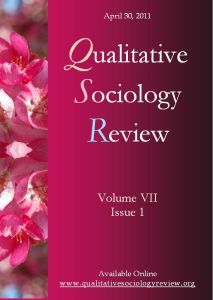Expectant Mothers: Women’s Infertility and the Potential Identity of Biological Motherhood
DOI:
https://doi.org/10.18778/1733-8077.07.1.02Keywords:
Identity Theory, Health, Infertility, Possible SelfAbstract
Using the voices of 196 infertile women we analyze women’s infertility from the perspective of identity theory. Results illustrate how the potential identity of becoming a biological mother can have an extremely high level of salience, therefore women enact behaviors that attempt to make the potential identity of motherhood a reality. However, because a discrepancy exists between the potential and actual identities, these women experience harmful consequences until they either become pregnant or choose to stop infertility treatments. By understanding how these women create, interpret, and sustain the potential identity of being a biological mother while struggling to reject a possibly permanent infertile identity, this study offers new insights into both the social process of infertility and identity theory.
Downloads
References
Blumer, Herbert (1969) Symbolic Interactionism: Perspective and Method. Englewood, NJ: Prentice-Hall.
Google Scholar
Burns, Linda H. (1990) “An Exploratory Study of Perceptions of Parenting After Infertility.” Family Systems Medicine 8: 177-189.
Google Scholar
DOI: https://doi.org/10.1037/h0089398
Charmaz, Kathy (1983) “Loss of Self: A Fundamental Form of Suffering in the Chronically Ill.” Sociology of Health and Illness 5: 168-195.
Google Scholar
DOI: https://doi.org/10.1111/1467-9566.ep10491512
Cooley, Charles Horton (1902) Human Nature and the Social Order. New York: Scribner’s.
Google Scholar
Goffman, Erving (1963) Stigma: Notes on the Management of a Spoiled Identity. New York: Simon & Schuster.
Google Scholar
Greil, Arthur L. (1991a) Not Yet Pregnant: Infertile Couples In Contemporary America. New Brunswick: Rutgers University Press.
Google Scholar
Greil, Arthur L. (1991b) “A Secret Stigma: The Analogy Between Infertility and Chronic Illness and Disability.” Advances in Medical Sociology 2: 17-38.
Google Scholar
Higgins, E. Tory (1987) “Self-Discrepancy: A Theory Relating Self and Affect.” Psychological Review 94: 319-340.
Google Scholar
DOI: https://doi.org/10.1037/0033-295X.94.3.319
Higgins, E. Tory, Ruth Klein and Timothy Strauman (1987) “Self-Discrepancies: Distinguishing Among Self-States, Self-State Conflicts, and Emotional Vulnerabilities”. Pp. 173-186 in Self and Identity: Psychosocial Perspectives, edited by K. Yardly and T. Honess. London: Wiley & Sons.
Google Scholar
Kirk, H. David (1964) Shared Fate. New York: Free Press.
Google Scholar
Leiblum, Sandra R. (1997) Infertility: Psychological Issues and Counseling Strategies. New York: John Wiley & Sons.
Google Scholar
Markus, Hazel Rose (1977) “Self-Schemata and Processing Information About the Self.” Journal of Personality and Social Psychology 35: 63-78.
Google Scholar
DOI: https://doi.org/10.1037/0022-3514.35.2.63
Markus, Hazel R. and Paula Nurius (1986) “Possible Selves.” American Psychologist 41: 954-969.
Google Scholar
DOI: https://doi.org/10.1037/0003-066X.41.9.954
Markus, Hazel R. and Paula Nurius (1987) “Possible Selves: The Interface Between Motivation and the Self- Concept”. Pp. 157-172 in Self and Identity: Psychosocial Perspectives, edited by K. Yardly and T. Honess. London: Wiley & Sons.
Google Scholar
Matthews, Ralph and Anne Matthews (1986) “Infertility and Involuntary Childlessness: The Transition to Nonparenthood.” Journal of Marriage and the Family 48: 641-649.
Google Scholar
DOI: https://doi.org/10.2307/352050
Mead, George Herbert (1934) Mind, Self, and Society. Chicago: University of Chicago Press.
Google Scholar
Menning, Barbara E. (1977) Infertility: A guide for the childless couple. New York: Prentice Hall.
Google Scholar
Meyers, Mimi (1990) “Male Gender-Related Issues in Reproduction and Technology”. Pp. 25-34 in Psychiatric Aspects of Reproductive Technology, edited by N.L. Stotland. Washington, D.C.: American Psychiatric Press.
Google Scholar
Miall, Charlene E. (1985) “Perceptions of Informal Sanctioning and the Stigma of Involuntary Childlessness.” Deviant Behavior 6: 383-403.
Google Scholar
DOI: https://doi.org/10.1080/01639625.1985.9967686
Miall, Charlene E. (1986) “The Stigma of Involuntary Childlessness.” Social Problems 33: 268-282.
Google Scholar
DOI: https://doi.org/10.2307/800719
Pfeffer, Naomi and Anne Woollett (1983) The Experience of Infertility. London: Virago.
Google Scholar
Sandelowski, Margarete (1993) With Child in Mind. Philadelphia: University of Pennsylvania Press.
Google Scholar
DOI: https://doi.org/10.9783/9781512806779
Sciarra, John J. (1994) “Infertility: An International Health Problem.” International Journal of Gynecology and Obstetrics 46: 155-163.
Google Scholar
DOI: https://doi.org/10.1016/0020-7292(94)90230-5
Strauss, Anselm, Juliet Corbin, Shizuko Fagerhaugh, Barney G. Glaser, David Maines, Barbara Suczek, and Carolyn Wiener (1984) Chronic Illness and the Quality of Life. St. Louis: Mosby.
Google Scholar
Stryker, Sheldon (1980) Symbolic Interactionism: A Social Structural Version. Menlo Park: Benjamin Cummings.
Google Scholar
Stryker, Sheldon (1987) “Identity Theory: Developments and Extensions”. Pp. 89-103 in Self and Identity: Psychosocial Perspectives, edited by K. Yardly and T. Honess. London: Wiley & Sons.
Google Scholar
Stryker, Sheldon (1991) “Exploring the Relevance of Social Cognition for the Relationship of Self and Society: Linking the Cognitive Perspective and Identity Theory.” Pp. 19-41 in The Self-Society Dynamic: Cognition, Emotion and Action, edited by J. Howard and P. Callero. New York: Cambridge University Press.
Google Scholar
DOI: https://doi.org/10.1017/CBO9780511527722.003
Stryker, Sheldon (1992) “Identity Theory”. Pp. 871-876 in Encyclopedia of Sociology, edited by E. Borgatta and M. Borgatta. New York: Macmillian.
Google Scholar
Stryker, Sheldon and Richard Serpe (1982) “Commitment, Identity Salience, and Role Behavior: Theory and Research Example.” Pp. 199-218 in Personality, Roles, and Social Behavior, edited by W. Ickes and E.S. Knowles. New York: Springer Verlag.
Google Scholar
DOI: https://doi.org/10.1007/978-1-4613-9469-3_7
Stryker, Sheldon and Anne Statham (1985) “Symbolic Interactionism and Role Theory.” Pp. 311-378 in Handbook of Social Psychology, edited by G. Lindzey and E. Aronson. Reading, MA: Addison-Wesley.
Google Scholar
Thoits, Peggy A. (1985) “Self-Labeling Processes in Mental Illness: The Role of Emotional Deviance.” American Journal of Sociology 91: 221-249.
Google Scholar
DOI: https://doi.org/10.1086/228276
Veevers, Jean E. (1980) Childless by Choice. Toronto: Butterworths.
Google Scholar
Downloads
Published
How to Cite
Issue
Section
License

This work is licensed under a Creative Commons Attribution-NonCommercial-NoDerivatives 4.0 International License.











